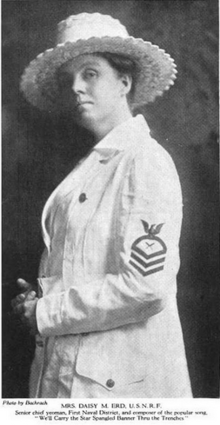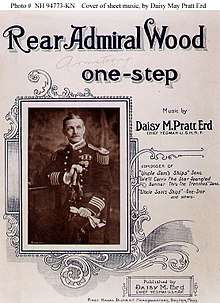Daisy May Pratt Erd
Daisy May Pratt Erd USNR (1882-1925) was a Canadian-born American songwriter and composer, and a naval Yeoman (F) in Boston, Massachusetts during World War I. After the war, she advocated for the recognition of women veterans.
Daisy May Pratt Erd | |
|---|---|
 Daisy Pratt Erd, from a 1918 publication. | |
| Born | Canada |
| Allegiance | United States |
| Service/ | United States Navy Reserve |
| Rank | Yeoman (F) |
| Spouse(s) | Louis Erd |
| Other work | musician |
Early life
Daisy May Pratt was born in Canada[1] and raised in Chicago, Illinois, where she taught music.[2]
Career

Erd was a young mother of two and a piano teacher, when she enlisted in the United States Navy Reserve in 1917.[3] Soon she was the chief yeoman in charge of all the enlisted women working in the Boston Navy Yard. She opened a lunch room for the naval yard's employees, and created the Hingham Naval Training Station Band, for the recreation of recruits with musical skills.[4] Compositions by Erd included "We'll Carry The Star Spangled Banner Thru The Trenches", "Uncle Sam's Ships" (a tribute to the USS Melville),[5] "Welcome Home", and "The Rear Admiral Wood One-Step" (written in honor of Spencer S. Wood).[1] She donated thousands of dollars in profits from these songs to the Naval Reserve Fund and the Naval Relief Society.[6] She was awarded a gold medal in 1918 by William R. Rush, commandant of the naval yard, "for merit, war service".[7]
After her active service, she helped to found the first women's post of the American Legion, in Boston, and was elected as commander of the post.[8] She successfully persuaded the American Legion's national executive committee in Washington D. C. to maintain the unique post's charter and Charlestown location, against some local opposition.[9] She advocated for a state bonus of $100 for women in Massachusetts who served in the Navy, and began a union to improve the women veterans' job prospects. "We did a man's job, and why shouldn't we be treated like the men are treated in the matter of bonuses?" she asked.[10] As a show of appreciation, the women of her American Legion post bought her ringside seats to a boxing match in Boston in 1921, assuring a reporter that "she will be tickled foolish when we tell her that she is going to the fight."[11]
Personal life
Daisy May Pratt married Louis Erd, a barber. They had two daughters, Norma and Georgia. Daisy Pratt Erd died in 1925, from tuberculosis that she contracted during her naval service.[1]
References
- E. M. Foxwell, "Daisy May Erd, Yeoman (F) and war composer" American Women in World War I (May 22, 2017).
- "To Sell Naval Song at Yeowomen's Ball" Boston Daily Globe (July 1, 1917): 9.
- "Two Youngsters Travel Alone from Boston" Chicago Tribune (September 2, 1917): 8. via Newspapers.com

- "Senior Chief Yeoman in First Navy District" Asheville Citizen-Times (October 20, 1918): 14. via Newspapers.com

- "American Music Goes To War, World War One in American Song Part 2: Over There, Page 2" The Parlor Songs Academy (December 2000).
- "Affairs and Folks" National Magazine (September 1918): 459.
- Lettie Gavin, American Women In World War I: They Also Served (University Press of Colorado 2011). ISBN 9781457109409
- "War Women Form Their First Post" Boston Daily Globe (July 9, 1919): 4.
- "Women's Legion Post May Remain" Boston Daily Globe (February 10, 1921): 6.
- Kristine Carlson Asselin, Women in World War I (ABDO 2016): 6-8. ISBN 9781680771022
- "Daisy Erd to Attend Fight" Boston Post (January 7, 1921): 17. via Newspapers.com

External links
- Sheet music for "The Rear Admiral Wood One-Step" by Daisy M. Erd, from the University of Florida Special and Area Studies Collections.